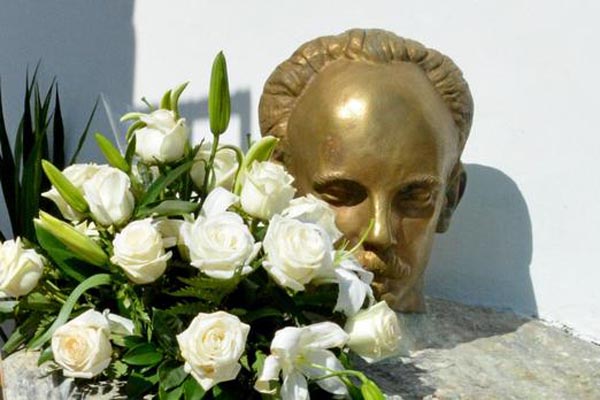The issue of such a complex is simple. The affront to Martí represents a blow to every good Cuban.
Cuba was his main reason, he became his soldier and knew how to gather and found, because the Homeland, well taught by the Master, goes beyond the geographical limits to a state of the soul. It was then and it is now, from Tampa to Santiago de Cuba, from Germany to Maisí.
Therefore, vandalism in his image, the sad news with which we started the year, is not only a matter of ideologies but of nationality, it is a wound to the essences of a country. The same one who has risen in his name, once again, to vindicate him in beautiful acts of love to his legacy and continuity.
José, the eldest son of Leonor and Mariano is the heritage of a town, even for something bigger than titles. His heroism surpasses the physical stature, the shabby suit, the electrifying verb and the captivating prose ... his heroism is in his life's work.
Well said it his best student, Fidel, at 150 years of January 28, 1853:
“A fervent lover of peace, union and harmony among men, he did not hesitate to organize and start the just and necessary war against colony, slavery and injustice. His blood was the first to be shed and his life the first to be offered as an indelible symbol of altruism and personal detachment. Forgotten and still unknown for many years by the people for whose independence he fought, from his ashes, such as Phoenix, emanated his immortal ideas so that almost half a century after his death an entire town would engage in colossal struggle, which meant the confrontation with the most powerful adversary that a large or small country had ever known. ”
Eduardo Torres Cuevas, historian member of the Council of State, said in these last days: “José Martí is not a single name, it is the reason itself, the idea, the feeling, the love, of what we all are. No one like him offered us a path, allowed us the full dignity of our people ”; and Abel Prieto, president of Casa de las Américas, said that in Martí "there is an authenticity, a virtuous attitude, a purity, a way of seeing life so generous, so noble, but so authentic, that it shakes."
In the central park that bears his name, at the University of Camagüey Ignacio Agramonte Loynaz, in schools, and even in house dialogues, words have dignified the most universal of all Cubans: the one who made us look freedom with a sense of continent , who taught us respect for the parents of our American independence, and that in the Sierra, at 1,942 meters high, calls us to look with the entrails of the nation.
It is not a matter of clay, plastic or pedestal. Martí is the heart of Cuba; he presses the work of a country that is renewed and challenged, that has in its texts the best school to face the monster of the North and that fills gardens with white roses. But there are blows that reach the ground and even the palms get inflamed.
These are days of definitions, like each one of which the Apostle lived. Therefore, that phrase that so swelled our patriotic vibes in Peru since the sincerity of Ambassador Juan Antonio Fernández fits in response to the most desperate anti-Cuban campaign of these times.
Pepe wrote it in The Golden Age: “In the world there must be a certain amount of decorum, as there must be a certain amount of light. When there are many men without decorum, there are always others who have in themselves the decorum of many men. Those are who rebel with terrible force against those who rob their peoples of their freedom, which is to rob men of their decorum. In these men thousands of men go, an entire people go, human dignity goes. Those men are sacred. ”
Translated by Linet Acuña Quilez

